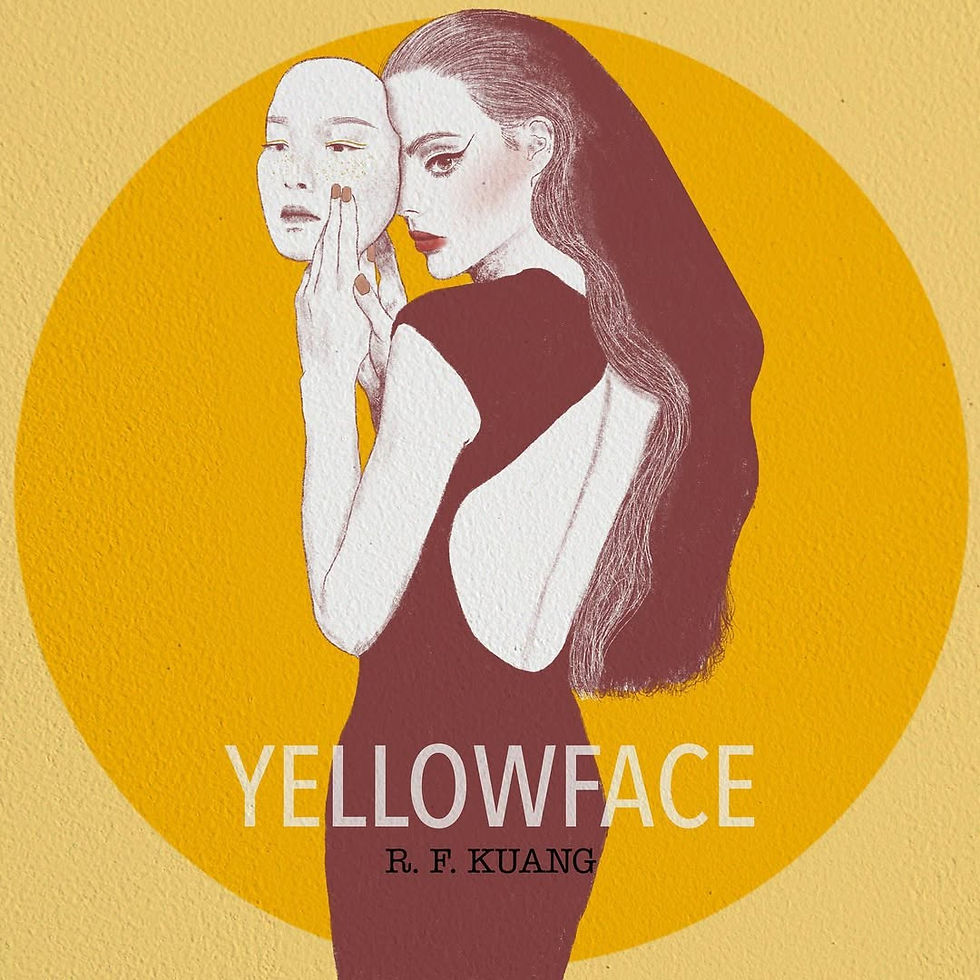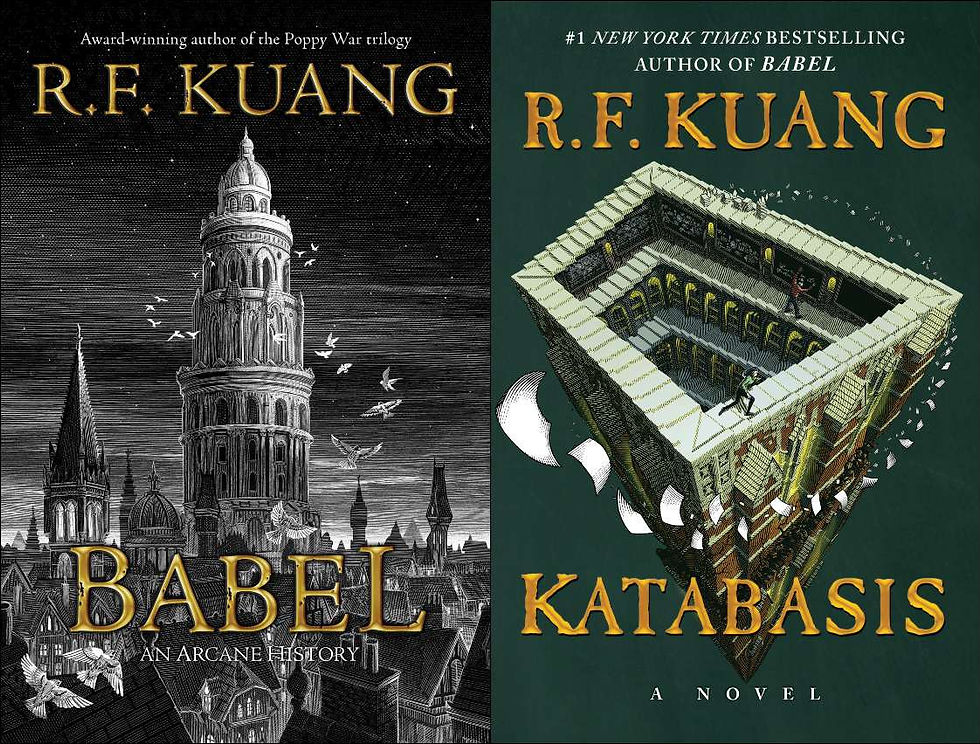The R.F. Kuang Hate is Ridiculous
- zachlaengert
- Sep 2, 2025
- 5 min read
Celebrity culture is holding us back
Who? What?
Rebecca F. Kuang is a prominent speculative fiction author whose published works include: The Poppy War Trilogy (which I wrote about back in my third ever post), Babel (which I recently mentioned here), Yellowface and the newly released Katabasis.
I first encountered Kuang when I was getting back into reading in 2022 and The Poppy War happened to be among the dozen or so modern fantasy novels I initially purchased. I loved the dark setting, the morally grey characters and how Kuang was inspired by both real historical events in the Sino-Japanese Wars and real Chinese mythology of the cardinal gods and shamanistic practices.
This ability to weave bits of reality into fiction is something I always appreciate, from novels like Chain-Gang All-Stars to Demon Copperhead. Kuang uses this technique, alongside drawing from her own personal experiences, in Babel and Yellowface as well, and I imagine Katabasis will demonstrate the same – though presumably Kuang herself hasn't been to hell and back.
Yet, try to discuss R.F. Kuang's works online – god forbid on Reddit – and you'll inevitably run into incredible amounts of hate, derision and dismissal. It's surprisingly loud and unified, and fairly unique besides: even objectively problematic authors are treated more leniently.
So what gives? And how can we learn from it, as individuals and as a society?
(Also, in case you missed it last week: one of my short fiction stories – “The Litany of Renewal” – has been published in the first issue of Vellum Mortis, a free e-zine by the fine folks at Memento Mori Ink & Crystal Lake Publishing! You can find the issue here if you’re interested in giving it a read.)

What it's definitely not...
... is her age, gender, race, education, talent or success. Obviously, no decent person in their right mind would say such a thing; they raise a hundred other concerns that I'll get to in a moment.
But it's truly strange to me – hence writing this article – what a disproportionate amount of hate Kuang gets for her five novels, the first of which she published at just 22 years old.
I personally despise 'romantasy' and much of the YA love triangle drivel that preceded it, but you don't see me (or pretty much anyone) lambasting these authors every time they are brought up. These books are derivative of derivatives of derivatives of derivatives of derivatives at this point, but no one particularly cares – they stick to their own lane and let other people enjoy what they (for some reason) enjoy.
So are Kuang's books truly so much worse than that? Or are there perhaps some other, undisclosed biases coming to the forefront and being held aloft by mob mentality?

Criticism & the Spotlight
So what are those hundreds of reasons people give for their disdain? Well, pretty much anything you can think of. Bland writing style, bland characters, preachy, over-reliant on exposition, lacking subtlety, poorly researched, anti-British Empire (lol), stuck up, overhyped, privileged, extreme changes in characters and one-note characters (both leveled at Rin from The Poppy War), etc. etc.
I'm going to set aside the criticism of her writing style because, again, there is (objectively) much worse out there that receives none of this hate – and also because I've never had a problem with it, and in fact have enjoyed it plenty.
I'm also going to set aside the criticism of her moral character and privileged upbringing. Maybe she is the worst and most privileged person on the planet (even in this hypothetical I will have to say aside from Trump), but she's still telling more progressive stories than 99% of authors today. Yellowface is a clever satire about appropriation and Babel features queer, diverse characters attempting to topple an oppressive colonialist regime; very few of even my favourite authors can really match that.

Then there's the research, for which people eviscerate every perceived mistake Kuang makes: about the Sino-Japanese conflict, about the publishing industry, about Oxford University and languages and literally everything else. And sure, some of it – particularly that brought by Chinese people and historians – is probably valid.
But in general: this is fiction, gang. It's her world and her book, and she can do what she wants. The Poppy War trilogy isn't even set in our world, but even Yellowface and Babel owe readers no more perfect accuracy about the world than Green Eggs and Ham does. Authors make mistakes – or intentionally alter details – all the time. Why burn Kuang alive for it?
Celebrity
Pull back for a second and I'm sure you can see parallels – probably more than I do, considering my lack of pop culture knowledge. But I think Taylor Swift is a decent comparison, no? Celebrity and the spotlight demand controversy and divided opinions. If a lot of people like something, it’s human nature that someone else will hate it with every fiber of their being.
And it does seem like the publishing industry has been pushing Kuang as a celebrity since day one. Marketing her books universally and making their presence inescapable – a precursor to Rebecca Yarros’ Fourth Wing, perhaps. As someone who doesn't particularly care for either Swift's or Yarros' work, I can suddenly find a little empathy for peoples' frustrations.
But it's still ultimately ridiculous to skewer Kuang for the popular attention she receives, just as it would be pointless for me to insult Yarros for receiving similar endorsements and attention. Don't hate the player, hate the game.
And admittedly, the game – celebrity culture – sucks. Even when it's not proving that the system is rigged, it's perpetuating blatant lies about the American Dream, beauty standards, endorsed products, mental health and so much more. The fact that it now also controls what people read, the perspectives and experiences they interact with, is terrifying.

A Healthier Approach?
First off, for the love of god (preferably not the Phoenix, but you do you), live your own life and don't compare yourself to anyone you see online. By the same token, try to think for yourself rather than simply imbibing what others are saying around you (I still struggle with this, especially generalized statements made by people I trust). Remember that so much of social media & pop culture – including advertisements and paid reviews of Katabasis or Onyx Storm – only exists to make money off of your attention, and I promise it will become easier to ignore.
In place of the predatory online world, cultivate real community! Discuss novels with a book club, and hey, maybe everyone will hate a book, but they'll probably have more meaningful reasons for doing so.
Any other tips you have for leading a more productive, less celebrity-focused life? I'd love to hear them!
Katabasis discussion coming in a few weeks, as you may have guessed. Thanks for reading and until next time <3





![[Lyrical] "Twenties" by Ghost: A Grim Vision of Trumpism](https://static.wixstatic.com/media/aaea48_92dd8a44da20488d92efbb0d59b6f8f7~mv2.jpeg/v1/fill/w_980,h_980,al_c,q_85,usm_0.66_1.00_0.01,enc_avif,quality_auto/aaea48_92dd8a44da20488d92efbb0d59b6f8f7~mv2.jpeg)

Comments